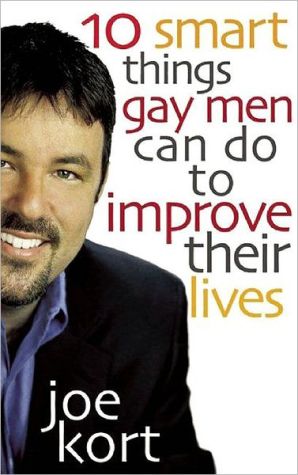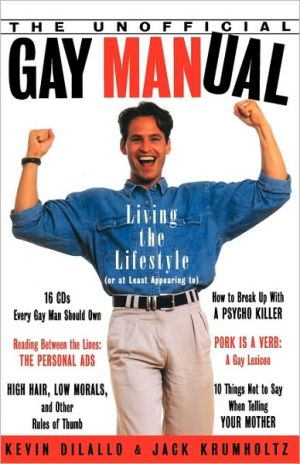Ten Smart Things Gay Men Can Do to Improve Their Lives
Openly gay therapist Joe Kort provides 10 powerful and positive steps gay men can take to isolate and overcome self-defeating behavior patterns, and move in healthier and more rewarding directions:\ Take Charge of Their Own Lives Affirm Themselves by Coming Out Resolve Differences With Parents and Relatives\ "Graduate" From Delayed Adolescence Avoid—or Overcome—Sexual Addiction\ -Learn from Successful Mentors Who’ve Been There, Done That Take Advantage of "Therapy Workouts"\ Achieve—and...
Search in google:
Reinvent your life and invigorate your relationships with these 10 powerful steps.
10 smart things gay men can do to improve their lives\ \ By JOE KORT \ alyson books\ Copyright © 2003 Joe Kort\ All right reserved.\ ISBN: 1555837824 \ \ \ \ Chapter One\ \ Take Responsibility for Your Own Life \ \ \ \ \ author of Finding Joy: 101 Ways to Free Your Spirit\ True: It's hard to love yourself more than you have been loved. But while it is difficult, it's not impossible! Let's see how you can love and empower yourself as a gay man.\ Many gay men who walk into my office know that I specialize in both sexual addiction and sexual compulsion. They may sound the same, but in fact they're quite different. Patrick Carnes, who coined the term sexual addiction in 1983, views the problem as an addiction, best treated by 12 Step and behavioral approaches. Eli Coleman, an award-winning sexologist and author of numerous books and articles on sexual compulsion, feels it's a compulsive sexual behavior defined by anxiety-reduction mechanisms rather than by sexual desire. In other words, he believes that the sexual behaviors are a means of reducing the levels of anxiety the person suffers from and not about a high sexual desire or addiction. And still others believe sexual compulsion is a repetition disorder, best treated by understanding whatever underlying conflict is being acted out. (For a full explanation, see Chapter 7.)\ Nick and his partner, Rolf, had been together for five years and had just relocated from California. They came to see me because one year earlier, Nick had logged onto their shared computer and found E-mails from other men, some with nude pictures attached. When confronted, Rolf admitted he had a sexual acting-out problem. He confessed that up to that point in their relationship, he'd had sex with many other men. Ever since, the two had struggled to get back to a safe, trusting relationship.\ Rolf claimed that since his original confession he'd had sex with no one but Nick. He was adamant: "I've done nothing!" But Nick was still distrustful and didn't believe him.\ During the six months they came to see me, Nick stated that Rolf's behavior only reinforced what he already believed about the gay community: Monogamy is a joke and a myth! All gay men are promiscuous and have lousy moral values. Nick was angry and disappointed that "gay life has to be this way." He remained with Rolf only because, as he confessed, "I don't believe it's any better out there with those guys who parade in drag or in leather and give gay men a bad name."\ Nick simply wanted Rolf "fixed." He wasn't willing to look at his own role in their relationship problem. Dutifully, Rolf started to attend my sexual addiction therapy group, as well as Sexual Compulsives Anonymous, a variation of Sex Addicts Anonymous for gay men. (For more information on various 12 Step groups available, see Chapter 5.)\ In our work, I pointed out that sexual addiction and promiscuity aren't unique to the gay male community. All men face these issues. Scan the tabloid headlines at the supermarket checkout and you'll see that cheating and promiscuity are challenges for straight people too. Nick had bought the common stereotype that many ignorant people preach: that we gay men are sexual beings only, nothing more. (Behavior that we might call promiscuity is sometimes really a symptom of postponed adolescence. More about that in Chapter 4.)\ Very often, sexual addiction results from sexual abuse in early childhood. There's help for these people, and Rolf was getting it. But Nick wasn't willing to explore how his own past contributed to their relationship. In fact, his own childhood was traumatic. His parents had abandoned him, leaving him to be raised by an aunt and uncle, separated from his siblings. Despite this obvious source of suffering, Nick felt that Rolf's behavior was all they needed to address.\ Even though Nick denied it, I suspected that it wasn't really Rolf but his own parents whom Nick wanted to condemn for not staying committed and being there for him. In Chapter 9, I explore why we choose partners who remind us of familiar, beloved caretakers from our childhood-and what happens as a result. In this instance, Nick was projecting-transferring onto Rolf his negative feelings and beliefs about his family and gay life in general.\ In the end, Rolf continued to work on his own issues, but Nick left him, without ever resolving their situation. Predictably, Nick met other partners who fit into his assumption that gay men couldn't be monogamous and committed to him. Because of his unwillingness to look at himself and to resolve his own personal issues, he never learned different.\ An ancient Chinese proverb states that a long journey starts with a single step. The point, of course, is that determination is the key to any endeavor. Without that do-it-yourself resolve to make things happen (as opposed to waiting around for them to happen), any attempt at a successful life-gay or otherwise-is doomed from the get-go.\ Very often, my clients begin conversation by talking about how society marginalizes us gay men and forces us into being sex junkies. They complain that they can't do anything about it because gay male culture supports sexual addiction. I remind them that heterosexists and homophobes do marginalize us. And yes, there's a strong emphasis on sex in our community. But that doesn't mean we have to live that way. (In Chapter 5, you'll discover how to ward off sexual addiction.)\ Gay men entering my office also know that I'm a certified Imago Relationship Therapist. Often, like Nick, they want me to help them figure out what's wrong with their partners, who need to change. Instead, we talk about what their partners might say about them and the troubles that their partners might be having with them. When each partner takes responsibility and vows not to point his finger at the other, only then can we begin to examine what contributes to problems in the relationship,\ Trying to fix another person is a dead-end road. More important-and far more effective-is to make the effort to clean up your side of the curb. Once clients are able to do that, they can realistically examine whether their relationships can survive. Luckily (as you'll see in Chapter 9), they often can.\ The 12 Step Serenity Prayer goes: "Grant me the serenity to accept the things I cannot change, the courage to change the things I can, and the wisdom to know the difference." Over the years, some people have modified it as follows: "Grant me the serenity to accept the people I cannot change, the courage to change the only person I can change, and the wisdom to know who that person is-me!"\ In my practice, I see a lot of gay men who don't get this. Until they recognize who that person is, true change remains beyond their reach.\ Other clients complain that the gay community (particularly Detroit's) is "superficial," "cliquey," "picky," or "judgmental." After further conversation, it's apparent they're voicing more of their own internalized homophobia. In the next chapter, you'll meet one of them, Carl. Once Carl identified the negative lens he used to see the world, his issues with our gay community were greatly reduced. Feeling better about being gay, he started to let go of many of the judgments he'd held about other gay men. He realized they simply reflected how he felt-or more exactly, how he had been taught to feel-about gay men.\ Yes, some of the judgments of men like Carl are based on reality. But learning how to create your own reality is the real challenge.\ Other men begin our conversation by trying to explain why they didn't come out earlier in life. They hold society responsible: "That was the 1950s [or the '60s], and no way could I have been out back then." But that doesn't explain why so many other gay men felt safe enough to come out during those times. The full explanation is missing. As you'll see in the next chapter, a man can have many reasons not to come out that may be just as important, if not more important, than the fear of social stigma.\ Often, he's unconsciously aware that if he does come out of the closet he'll have to deal with other psychological "dust bunnies" that he has swept under the rug-issues like finding his authentic self and dealing with family traumas and issues.\ Clients like Nick criticize the gay community and sometimes even make homophobic remarks about Gay Pride events. "Why do we have to have a parade? Straight people don't need parades." I respond by asking, "Do you feel the same way about the St. Patrick's Day Parade, or the Jewish Walk for Israel, or the various ethnic festivals we have here in Detroit?"\ They usually say no, adding, "But that's different. Those festivities aren't about sexuality." Nor are Gay Pridefests. Yes, some of the men dress in drag or leather, but don't marchers in the Irish parades and ethnic festivals also wear their ethnic "drag"? This is simply a negative filter imprinted early in childhood upon us gay men. There's a whole culture for us to celebrate, honor, and witness just as these other events and festivities do.\ Internalized homophobia is very common. Again, this process is unconscious, we're not aware of it. From infancy, we're handed messages that being gay is "wrong" and "bad." So many gay men (and lesbians too) believe the myths and lies perpetuated by heterosexuals-and by gays and lesbians as well!\ Then one day-usually in our early teens-we discover that our true, authentic nature is the very thing we've been taught to loathe. We take the homophobia that's been drummed into us and direct it inward, toward ourselves. Again and again in my office, I see the harm and destruction that result when gay men can't accept who they are and-worse yet-judge themselves and others by heterosexual standards. This internalized homophobia often compels gay men to be cruel to themselves and one another.\ Psychology 101 teaches the concepts of projection and transference. Projection means to assign your own characteristics to other parties in your life. It can be both positive and negative. We constantly make up stories-often, total fantasies-about other people's thoughts, motivations, and intentions. Only rarely do we stop for verification or give others a chance to tell us who they really are. We think we know a person, and there it ends. Problem is, our story is often more about us than about anyone else.\ Back when I was taking an Imago relationship training course for therapists, I was shocked to hear of a woman who, after 30 years of marriage, was just beginning to discover who her husband really was! Until then, she'd been making up stories about her spouse-few of them accurate! She'd assumed that her unspoken opinions and judgments corresponded to his feelings and experiences.\ Her stories about him were really about her. Whenever she felt down in the dumps, she believed that he didn't respect her "moods" and couldn't tolerate her depressions. Not so! He was simply trying to cheer her up and help her feel better, always with the best of intentions. Her projections arose from her belief that if he really loved her, he'd respond to her in certain ways. This is "magical thinking"-the belief that others will know what we want without our telling them. It was the woman's responsibility to tell her husband that she needed to work through her depressions on her own.\ We're born into a culture that generally encourages negative projections toward gay men. Tell some heterosexuals that you're gay and they automatically imagine you in bed with another man and then accuse you of putting your sexuality in their face! But this is projection: They're blaming you for "making" them imagine your sexual behavior.\ A school principal once invited me to give a presentation on homosexuality to a group of teachers in his school system. They knew I was coming and understood the topic I was going to present. Afterward, I learned that some teachers had been so upset that they'd stopped listening-or even walked out-simply because I talked about my partner. They felt it was "inappropriate" for me to talk about my "personal" life and that I'd been "preachy" to talk about him and to stick my "gayness" in their face. All I'd done was refer to Mike, naturally and honestly, as an important part of my life as a gay man. If a heterosexual male referred to his wife or girlfriend, people would not get up and leave the room! They'd never accuse the speaker of pushing his sex life in their faces.\ Judgments are an inescapable part of daily life. But for gay men, judgment often spells danger, since we're usually judged unworthy as soon as we reveal who we really are. The accumulative effect of these negative judgments takes a toll on our lives. But at the same time, they can contain valuable insights that we shouldn't overlook.\ I agree with the client who told me, "Our creator gave us two ears and one mouth, so we can listen twice as much as we talk!" This concept is easy to grasp, but hard to put into practice. It demands that you stop pointing your finger at other parties and ask what your reactions-especially when they're out of proportion to the situation-say about you.\ If you react strongly to people who behave in certain ways or say certain things, your reaction says more about you than about those to whom you're reacting. In fact, about 90% of any exaggerated reaction is about yourself.\ Big reactions are appropriate to phenomena like gay bashing, the Holocaust, child molestation, and serial killers. However, if someone cuts you off in traffic and you give him the finger, your response is out of proportion to the situation. Maybe the driver didn't see you or really didn't mean to cut you off. Irritation is appropriate. Being outraged and even vengeful is overreacting.\ Transference means to take the positive and negative traits of significant, influential people in our lives and unconsciously transfer them onto somebody else-usually one's partner, friend, colleagues, or therapist. Usually the people we feel closest to. We professionals actually hope for this! We want clients to transfer their feelings onto us so we can help them see the issues they have with other people in their lives, resolve them, and move on.\ Imago Relationship Therapists understand that in relationships this phenomenon is normal. We try to help couples understand that partners do engage in transference with one another and that it's usually a positive indicator they're in a healthy relationship.\ No one is free from projection, transference, or judgments. The crucial issue is to learn how to deal with them. Judgments are not innately "bad." You can use them in very effective ways once you accept that your reactions are your own and that they tell you a lot more about yourself than about the people you judge.\ \ Continues...\ \ \ \ Excerpted from 10 smart things gay men can do to improve their lives by JOE KORT Copyright © 2003 by Joe Kort\ Excerpted by permission. All rights reserved. No part of this excerpt may be reproduced or reprinted without permission in writing from the publisher. \ \




